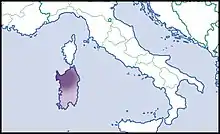Ariunculus isselii
Ariunculus isselii is a species of terrestrial slug belonging to the family Arionidae.[2][3] Previously it has been placed in the genus Arion[4] or in its own genus Ichnusarion;[5] the latter is more often treated as a subgenus.
| Ariunculus isselii | |
|---|---|
| Scientific classification | |
| Domain: | Eukaryota |
| Kingdom: | Animalia |
| Phylum: | Mollusca |
| Class: | Gastropoda |
| Subclass: | Heterobranchia |
| Order: | Stylommatophora |
| Family: | Arionidae |
| Genus: | Ariunculus |
| Species: | A. isselii |
| Binomial name | |
| Ariunculus isselii | |

The species is restricted to the island of Sardinia, but widespread there, from sea level to at least 1400 m. Its length crawling can approach 10 cm. Superficially it looks like other large slugs in the related genus Arion, with the pneumostome in the front part of the mantle; its coloration is olive-grey with bright yellow pigment granules superimposed. Unlike species in the arionid genera Arion and Geomalacus, it does not use a spermatophore in its mating, which usually involves 12 hours of courtship. The species can also self-fertilise.[6]
References
- Lessona, M.; Pollonera, C. (1882). Monografia dei limacidi italiani. Turin: Loescher. pp. 1–82, pls 1-3.
- "Ariunculus isselii Lessona & Pollonera, 1882". www.gbif.org. Retrieved 29 October 2021.
- "WoRMS - World Register of Marine Species - Ariunculus isselii Lessona & Pollonera, 1882". www.marinespecies.org. Retrieved 29 October 2021.
- Manganelli, G.; Bodon, M.; Favilli, L.; Giusti, F. (1995). "Gastropoda Pulmonata". In Minelli, A.; Ruffo, S; La Posta, S (eds.). Checklist delle specie della fauna italiana 16. Bologna: Calderini. pp. 1–60.
- Schileyko, A.A. (2007). "Treatise on Recent terrestrial pulmonate molluscs. Part 15: Oopeltidae, Anadenidae, Arionidae, Philomycidae, Succineidae, Athoracophoridae". Ruthenica (Supplement 2): 2049–2210.
- Hutchinson, John M. C.; Reise, Heike (May 2015). "Mating in Ariunculus isselii, an arionid slug without a spermatophore". Journal of Molluscan Studies. 81 (2): 247–258. doi:10.1093/mollus/eyu086. Retrieved 3 April 2022.